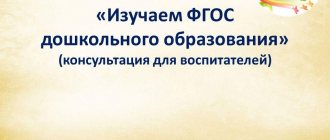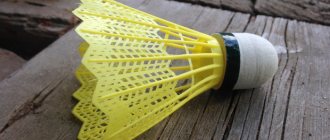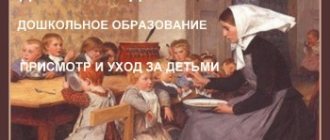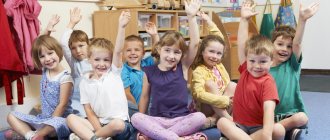What is the national-regional component in OOD?
Let's think logically together. To do this, let’s figure out what the national-regional component is in the process of OOD - organized educational activities.
So, modern educational programs necessarily include a regional component in the process of training, development and education to implement the principle of integrity and integration of preschool education, taking into account the ethnocultural, climatic, geographical, and historical characteristics of a particular region. And this component is implemented through the various activities of children in preschool educational institutions.
The regional component consists of three areas: the study of the ethnoculture of one’s region, the second national language and the history of the region.
Let's consider the types of activities through which the national component is implemented:
- Game activities – thematic national role-playing games;
- Visual activities - modeling, drawing, appliqué with national motifs and introductory conversations on relevant topics;
- Physical culture – outdoor folk games;
- Special events: holidays, matinees, celebrations with a national twist;
- Cognitive activities: excursions, visiting museums, folk art exhibitions;
- Educational and developmental activities - conversations, reading fiction on the history, culture, language of the region, finger folk games, nursery rhymes, poetry;
- Musical classes - learning folk songs, dances, familiarization with ethno-instruments.
It follows from this that the regional component is not carried out as a separate type of joint activity between the teacher and preschoolers, but as a permanent element of the educational process. Let’s say sculpting a national toy, drawing a towel pattern, appliquing a folk jug - this is the implementation of the national component.
And before the lesson, we have an introductory conversation in which we introduce the children to some aspect of national culture and history. As for learning a second national language, there are special programs for this. Honestly, I am not very competent in this matter. Perhaps, in addition to daily activities according to the regular program, additional time is allocated for learning the native language.
MAGAZINE Preschooler.RF
Implementation of the regional component in the educational activities of preschool educational institutionsTatyana Alekseevna Vikanova, head of the MBDOU - kindergarten "Fairy Tale" in the village of Shipunovo, Shipunovsky district, Altai Territory
At the stage of implementation of the Federal State Educational Standard for Preschool Education, teachers creatively comprehend the new content of preschool education, find more effective ways, forms and methods of organizing professional activities as a creative process. The educational institution "Fairy Tale" works in an innovative mode on the topic "Implementation of the regional component in the educational activities of preschool institutions . In the context of the implementation of the Federal State Educational Standard, the teaching staff prioritizes the task of introducing new forms and technologies of work into the educational process; ensuring a high level of methodological support of the educational process; organization of the social, everyday and subject-spatial environment of preschool educational institutions.
Sufficient conditions have been created for the implementation of the regional component, which are currently being brought into line with the Federal State Educational Standard. On the territory of the preschool institution there is a corner of the forest and a corner of the garden, where preschoolers get acquainted with the trees and shrubs of the area in which they live; there are a large number of flowers that the pupils look after. In each age group, corners of the Motherland are decorated, which contain illustrative material, postcards, photo albums to familiarize preschoolers with the family, kindergarten, village, region, their symbols, the capital of the Altai Territory - Barnaul, animals and plants of the Altai Territory, where children are in free conditions access can replenish and consolidate their knowledge about their small homeland. In the isocorners there is material collected by children for visual arts. In the corners of the book there are collections of works for children by the Shipunov poetess V.Yu. Zolotoreva, magazines, books about her native land. In addition, the preschool educational institution is equipped with a “Russian Upper Room” , which displays antiques and household items. In the music room there is an audio library “Dearest Side” and a video library “My Small Motherland” . In the costume room there are several versions of Russian folk costumes. In the teaching room, teaching materials, visual aids, illustrations, paintings, and samples of mineral resources of the region and region are designed to help educators. The thematic inspection carried out on the topic “Changes in the subject-development space that meet the requirements of the Federal State Educational Standard” shows that the preschool educational institution is working to enrich a safe, multifunctional and rich subject-development space in accordance with the requirements of the Federal State Educational Standard.
It should be noted that an important advantage of a rural kindergarten in the implementation of the regional component is the presence of natural conditions that promote active interaction and enrichment of the child’s emotional world when communicating with living nature - forest, field, river, children learn to listen to the voices of their native nature, to smell the smells , admire the pristine beauty. All this takes place in the organization of the educational process. In the fall, teachers and children collect flower seeds, natural material for use in productive types of agricultural activities (cones, stones, dried plants). Children are not just observers; in family education, they are familiar with the complexities of the work of a grain grower, vegetable grower, and livestock breeder; they are participants in “adult” life, gaining a sense of responsibility for the assigned work, caring for nearby pets, learning the patterns of the rhythm of rural life, its traditions.
The regional component is the area of the child’s exploration of the world, where his values are shown through the culture and history of his region. In accordance with the Federal State Educational Standard and taking into account the partial program “From the Native Threshold” (edited by E.V. Zateev), the preschool educational institution has developed an educational program “Where does the Motherland begin?” (hereinafter referred to as OP) on raising children based on the cultural traditions of the Russian-speaking population of the Altai Territory. The EP reveals the development of children in all educational areas: social-communicative, cognitive, physical, speech and artistic-aesthetic. The program is based on the principles of cultural conformity (maximum use in the educational process of cultural elements of the Russian-speaking population of the Altai Territory is assumed), environmental conformity (the organization of the pedagogical process is implemented in accordance with the laws of nature: its rhythms, cycles - according to the folk calendar); taking into account “zone of proximal development” (ahead of development, but not going beyond the age-related “sensitive periods” ), the principle of “nationality” , the principle of cooperation (interaction between an adult and a child as equal partners).
As part of the implementation of the EP, cooperation with the families of pupils and society is formalized by an Agreement and a jointly developed plan for the current year. Social partners in shaping preschoolers’ ideas about their small homeland are educational institutions (school named after A.V. Lunacharsky), institutions of additional education (music school named after V.T. Khristenko, children’s creativity center, sports school), cultural and public institutions (library, museum, cultural and leisure); law enforcement agencies (traffic police, Ministry of Emergency Situations); municipal institutions (Russian Post, regional consumer society, motor transport enterprise, center for social assistance to families and children, boarding home for the elderly and disabled). Jointly held events contribute to the development of active citizenship and the desire to participate in the life of the kindergarten and native village: a thematic week on fire safety, a performance at the village festival “100th anniversary of the village of Shipunovo” , an exhibition of creative works for the 90th anniversary of the Shipunovo district, etc. An invaluable contribution to the implementation The regional component is made by cooperation with the regional museum of local lore and the museum of the school named after. A.V. Lunacharsky. The museum introduces preschoolers to the historical past of their small Motherland and has great educational value. In terms of cooperation, not only excursions, but also monthly “Museum classes” . For example, “For you, fellow countrymen!” to familiarize yourself with the work of Shipunov artists S.A. Bozhenko, A.G. Gikal et al., “Our Little Brothers” about the flora and fauna of our small Motherland.
The basis for organizing the educational process according to the EP “Where does the Motherland begin?” , draws up a comprehensive thematic plan with the leading activity “game” and taking into account the age capabilities of children. Educational work is divided into blocks - “Me and my family” , “My kindergarten” , “My village-Sipunovo” , “Altai Territory” , “Ecology of the small homeland” , “Decorative and applied arts of Altai” , “Customs and traditions" , "Native army" , "Village workers" , "Famous fellow countrymen" . Work on each block solves certain problems. For example, the block “Me and my family” forms a spiritual and moral attitude and feelings of belonging to one’s home, family, especially to the mother; "Village Workers" block fosters a respectful attitude towards the human worker and the results of the labor of the people of their village and region; “Ecology of a small homeland” expands the understanding of nature and its laws, teaches to see its beauty, to live with it in peace and good neighborliness, without disturbing its rhythm, etc. Solving the problems of the educational program is carried out in the forms of joint activities of adults and children (direct educational activities, educational activities during routine moments), in the independent activities of preschoolers and in interaction with the families of pupils. A variety of events are held in accordance with a comprehensive thematic plan: the theatrical performance “In the Land of Russian Folk Tales” , the folk festival “Rowanberry” ; exhibitions of joint works with parents “Children’s Safety on the Street” , “Family Album” ; family sports events "Health Day" , marathon "Running Day" , children's projects "Canteen for Birds" , "My Little Motherland" , holiday "Mother's Day" , concert program for Agricultural Workers' Day in the regional cultural center, excursions to the bakery, to a pharmacy, a sewing workshop, reading works of art, including those of fellow countrymen. Based on the themes of the events, a photo exhibition for parents “Life in kindergarten” . Cultivating love for the Motherland and native village means connecting educational work with the social life that surrounds the child. Thus, civic and patriotic education permeates all types of children’s activities throughout the entire period of the child’s stay in the preschool educational institution.
Additional work is also organized taking into account the regional component, for example, the work plan of the folklore group “Zernyshki” was developed according to the folk calendar. Folklore works reflect the national identity of the people, rich material for instilling love for the Motherland and the origins of folk culture. In addition to planned events, every year in October children prepare a concert program for the Day of the Elderly and perform at the “Boarding Home for the Elderly and Disabled” in the village of Shipunovo.
The most important link in the implementation of the EP, the innovative topic, and the introduction of the Federal State Educational Standard for Educational Education is the teaching staff. Various forms of methodological and educational work allow each teacher to demonstrate their existing abilities, and connecting to the Internet and using ICT in educational work makes it possible to increase the professional level of teaching staff and improve the quality of the educational process. The activity of teachers is manifested in the methodological work of preschool educational institutions, for example, the Council of Teachers “Socialization of a preschool child through the organization of observations, excursions and targeted walks” , in the work of the regional association of educators on the topic “Russian folk game as a pedagogical phenomenon” , where the folk game is formalized and presented “ Paints” , in the work of the internship site.
As part of the internship platform, teachers share their work experience on the topic “State-public quality management of preschool education in the context of the implementation of the Federal State Educational Standard for Preschool Education . “Civil-patriotic education of children in the context of the implementation of the Federal State Educational Standard for Education” prepared for students ; open viewings of the educational activities “My Family” , “My Motherland is Russia!” , additional work with children, an integrated lesson of the folklore group “Zernyshki” and the art studio “Vesyolyi Pencil” , a master class on designing an educational program for a preschool educational institution (using the example of “Where the Motherland Begins” ), the project “Shipunovo - My Little Motherland!” .
The development of regional content is considered through the implementation of a system-activity approach, when children not only learn information from the history of their village, but experience real emotional events. In this regard, the preschool educational institution organized a presentation of the children's book “The Wonderful Song” by the Shipunov poetess V.Yu. Zolotareva (chairman of the district club “Consonance” , author of several books). Before the planned meeting, the children familiarized themselves with the contents of the book, created drawings based on the poems, which became illustrations in the book, and at the meeting the children read their favorite poems. It is difficult to overestimate the importance of such a two-way live dialogue between the author and the reader. The conversation touched not only on literary aspects, but the children clearly felt the relationship between literature and life - with the life that surrounds them every day. In this way, children learn the peculiarities of the culture of their village, show sincere interested attention to the people who live nearby and glorify their native land.
Traditionally, in the Shipunovsky district, on the Day of National Unity, a festival of patriotic songs “I Sing My Fatherland” ; the vocal group “Rosinochka” presented the artistic number “I live in Russia” . In addition, the active life position of children, teachers and parents is formed through the organization and participation in many competitions. For example, the Winter Regional Spartakiad “Dad, Mom, I am a sports family!” , regional competition of arts and crafts and fine arts “Christmas Star” , regional competition of arts and crafts and fine, technical creativity “Constellation of Miracles Not Made by Hands” , all-Russian entertaining quiz “Fairy Tales Dance in a Round Dance” , “Seasons” , etc. In general, for specified period, 150 children took part in various competitions and festivals, all of them have winners' diplomas or participant certificates. Being a participant in various types of activities, the child is socialized, masters ways of behavior, cultural norms and values, and grows spiritually and physically.
Skazka preschool educational institution , each child gets the opportunity to fully develop, to be a participant in specifically children’s activities: playful and productive, motor and cognitive-research, to live through the wonderful age period of “childhood” , and not to prepare for later life.
The results of work on the innovative topic “Implementation of the regional component in the educational activities of preschool education” are considered as target guidelines, which represent socially normative age characteristics of children’s achievements at the stage of completing preschool education. They show patriotic feelings, feel pride in their small homeland and its achievements; have primary ideas about family, traditional family values; have basic understanding of the natural and social world in which they live.
| Next > |
Club work as a way to implement the national-regional component of the program
Usually, club activities in the kindergarten are organized by the decision of the management and parents of the students. At the beginning of the school year or at the end of the previous one, a survey is made about the need for additional education for children in the form of clubs in the afternoon. These can be in different directions, including the study of language, folk crafts, creativity, and the history of the region.
All this should not happen spontaneously, as we want. But, at the request of the teacher, he can initiate the creation of a circle and lead it if the management approves this desire. In my experience, there are almost no folk clubs; outside the program, children additionally study foreign languages, dance, sports, and a literacy and arithmetic club is also practiced.
Conclusion: the regional component is not prescribed separately, but as part of the daily educational program, but it is possible, if desired, to lead a circle in the national direction.
I hope I answered the question? If something is wrong, write, I will add information or clarify. Subscribe to updates and share the article with friends. See you!
Sincerely, Tatyana Sukhikh! Till tomorrow!



